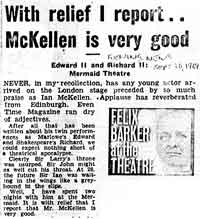|

|
I was in Ireland (1968) supporting a big movie
star in an epic no-one
ever saw - I hope — when Richard Cottrell, a friend from
Cambridge days, bravely invited me to play for the touring
Prospect Theatre Company. He flew out to the location, where we
planned the production together. We realised that all the leading
characters of the drama were related and that it was a royal
family saga of squabbling marriages, rebellious sons and worried
parents, of cousins who love or hate each other. Head of the
Family is one of the youngest and least suitable members, ruling
with the divine right of kings. At the outset, King Richard
behaves as if he were God himself and it is only as his power is
challenged and eventually usurped, that he comes to painful terms
with those human failings which had marred his kingship. Yet, as
the king declines and the more he suffers, the more impressive he
grows as a man. This left me with the main acting problem, of
understanding what if feels like to be a god. |

As Richard II

|
|
 |
Being a king is always easy. You
wear a crown and a glittering robe (mine was partly fashioned out of
milk-bottle tops); you sit on the throne upstage and get the rest of
the cast to kowtow. You walk ever so slowly, like the Queen always
does, as if the slightest hurry would crack the precious glass which
invisibly protects you from your subjects. But the House of Windsor
is not divine. I had to look around for some other, modern
equivalent of King Richard, which might connect Shakespeare's
mediaeval monarch with our contemporary experience. I thought
of the present Dalai Lama, who was deposed and desanctified by the
Chinese invasion of Tibet and I devised a half-oriental gesture
which might symbolise divinity, both hands raised, protecting the
crowned head with a double blessing.
|
I also took heart from an example nearer home. My movie-star colleague
lived on location, surrounded by a little court of employees and fans,
who guarded his security, carried his cash, laughed at his jokes,
procured his women and gave me the creeps. One day he had told me how
responsible he felt for the welfare of his sycophantic crew. 'It's like
climbing a mountain, roped to them all. They depend on me not to slip.
There's no-one above me to save me if I fall. Of course I won't fall but
none of them realises how lonely it is at the top.' That cliché was it -
although Richard, of course, puts it better:
'You have but mistook me all this while:
I live with bread like you, feel want,
Taste grief, need friends... |
Richard II is a star. Show business is littered with the corpses
of stars who have been unable to reconcile their public image with their
inner insecurity. Richard is more resilient and he doesn't commit
suicide. We had him, at the end, fighting off his murderers (as
Holinshed records) like a lion.
All this added up to a performance which was noted for breaking
with the recent tradition of a limp-wristed playboy, cocking an elegant
leg over his throne. Just as I was feeling rather pleased with myself, a
letter arrived from an ex-critic, who analysed every detail in my
supposedly innovative performance and said she had seen it all before,
here and there, in Maurice Evans, Redgrave, Gielgud and John Neville.
All the actor can do is try and inhabit these classical parts. He never
owns them.
  
|




